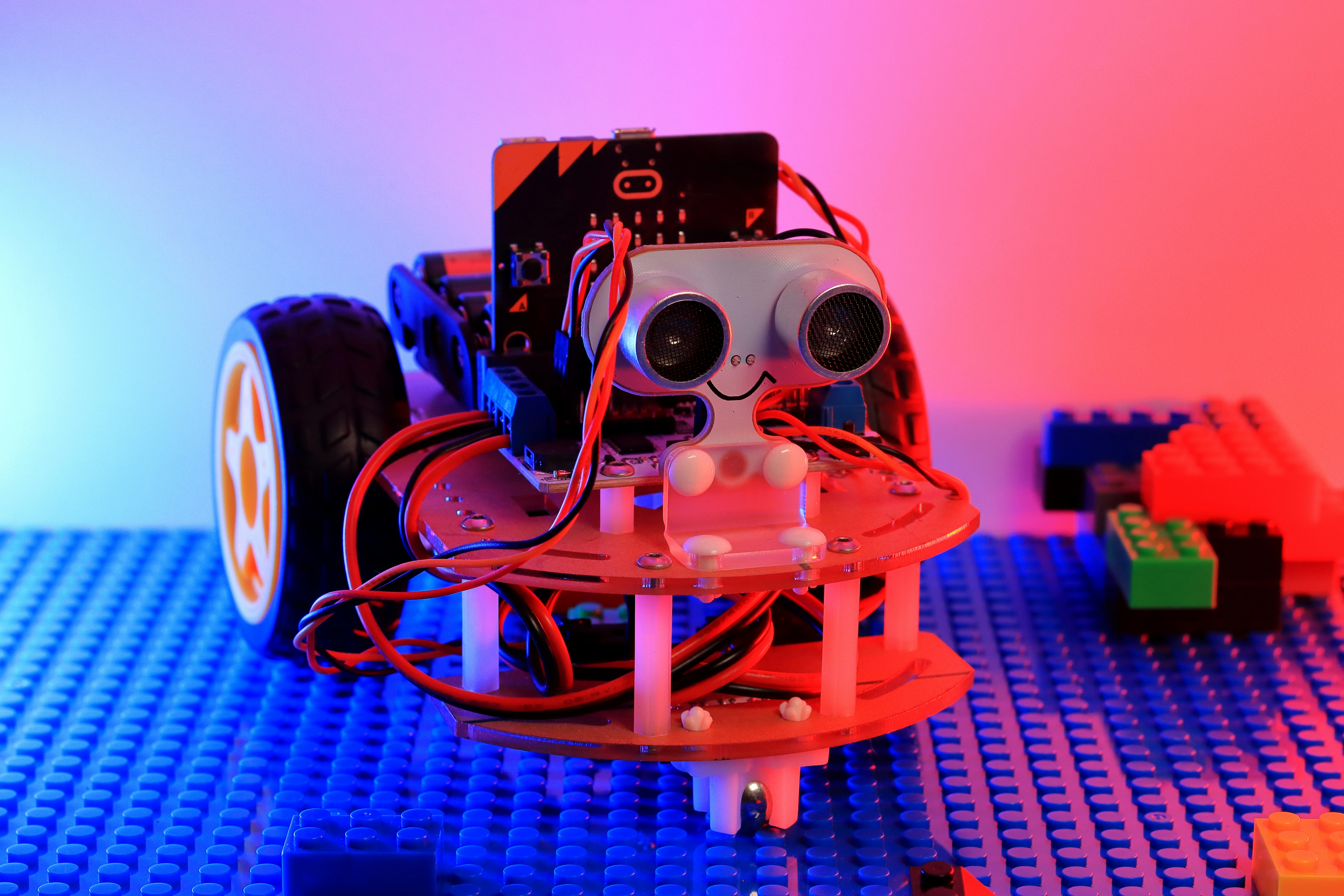
Ever wondered what separates a hobbyist tinkering with robots in their garage from a sought-after robotics engineer commanding six-figure salaries? The answer often lies in certifications—those golden tickets proving you’ve mastered the complex languages and frameworks that bring robots to life. At Robotic Coding™, we’ve seen firsthand how the right robotics coding certifications can transform careers, opening doors to cutting-edge roles in AI-driven automation, industrial robotics, and beyond.
Did you know that the robotics industry is projected to grow by over 9% through 2030, outpacing many tech sectors? That means now is the perfect time to invest in certifications that not only validate your skills but also future-proof your career. In this article, we’ll walk you through the top 8 robotics coding certifications you need to know about—from the industry-standard Robot Operating System (ROS) to specialized certifications in collaborative robots and cloud robotics. Plus, we’ll share insider tips on choosing the right path and acing your exams, so you can confidently step into the world of robotics programming.
Key Takeaways
- Robotics coding certifications are essential for standing out in a rapidly growing and competitive job market.
- The top certifications cover a range of skills, including ROS mastery, Python and C++ programming, AI integration, and vendor-specific platforms like FANUC and Universal Robots.
- Selecting the right certification depends on your career goals, current skill level, and industry demand.
- Hands-on practice, online courses, and community engagement are key strategies to successfully prepare for certification exams.
- Certified professionals enjoy better job prospects, higher salaries, and opportunities in cutting-edge fields like cloud robotics and autonomous systems.
Ready to unlock your robotics potential? Let’s dive in!
Table of Contents
- ⚡️ Quick Tips and Facts: Essential Insights for Aspiring Roboticists
- The Evolution of Robotics Education: Why Coding Certifications Matter More Than Ever
- Unlocking Your Robotics Potential: The Power of Coding Certifications
- Navigating the Certification Landscape: Types of Robotics Coding Credentials
- Top Robotics Coding Certifications to Propel Your Career Forward
- Mastering Robot Operating System (ROS): The Industry Standard 🛠️
- Python for Robotics: The Versatile Language of Automation 🐍
- C++ in Robotics: Performance and Control at Your Fingertips ⚙️
- AI and Machine Learning for Robotics: The Brains of the Operation 🧠
- PLC Programming for Industrial Robotics: Bridging IT and OT 🏭
- Collaborative Robot (Cobot) Certifications: Working Hand-in-Hand 🤝
- Drone and Autonomous Systems Certifications: Taking Flight ✈️
- Cloud Robotics Certifications: The Future is Connected ☁️
- Choosing Your Path: How to Select the Best Robotics Coding Certification for You
- Preparing for Success: Strategies to Ace Your Robotics Coding Certification Exams
- Beyond the Certificate: What Comes Next for Your Robotics Career?
- Conclusion: Your Journey to Becoming a Certified Robotics Coding Expert Begins Now! ✨
- Recommended Links: Further Resources for Your Robotics Adventure 🔗
- FAQ: Answering Your Burning Questions About Robotics Coding Certifications 🤔
- Reference Links: Our Sources and Inspirations 📚
Quick Tips and Facts: Essential Insights for Aspiring Roboticists
As we delve into the world of robotic coding, it’s essential to understand the fundamentals. At Robotic Coding, we specialize in providing comprehensive resources for robotics education and coding languages. Here are some quick tips and facts to get you started:
- Robotics is a multidisciplinary field that combines engineering, computer science, and mathematics.
- Coding languages such as Python, C++, and Java are commonly used in robotics.
- Robot Operating System (ROS) is a popular open-source software framework used in robotics.
- Artificial intelligence (AI) and machine learning (ML) are increasingly being used in robotics to enable autonomous systems.
For more information on robotic simulations, visit our category page at https://roboticcoding.com/category/robotic-simulations/.
The Evolution of Robotics Education: Why Coding Certifications Matter More Than Ever
The field of robotics is rapidly evolving, and the demand for skilled professionals is on the rise. According to a report by the International Federation of Robotics, the robotics industry is expected to grow significantly in the coming years. To stay ahead of the curve, it’s essential to have the right skills and certifications. Coding certifications can provide a competitive edge in the job market and demonstrate expertise in specific areas of robotics.
Unlocking Your Robotics Potential: The Power of Coding Certifications
Why Invest in Robotics Coding Certifications? 🚀
Investing in robotics coding certifications can have numerous benefits, including:
- Improved job prospects
- Increased earning potential
- Enhanced skills and knowledge
- Demonstrated expertise in specific areas of robotics
The Tangible Benefits: What Certifications Bring to Your Career 💼
Certifications can bring numerous tangible benefits to your career, including:
- Increased credibility: Certifications demonstrate expertise and commitment to the field.
- Improved job prospects: Certifications can increase job prospects and provide a competitive edge in the job market.
- Higher earning potential: Certified professionals can earn higher salaries than non-certified professionals.
Navigating the Certification Landscape: Types of Robotics Coding Credentials
General Robotics Programming Certifications: Broadening Your Horizons 🌍
General robotics programming certifications can provide a broad foundation in robotics programming and are often vendor-agnostic. Some popular certifications include:
- Certified Robotics Programmer (CRP): Offered by the Robotics Institute.
- Robotics Programming Certification: Offered by Blue Ridge Boost.
Vendor-Specific Robotics Certifications: Mastering Brand Ecosystems 🤖
Vendor-specific robotics certifications can provide in-depth knowledge of specific robotics platforms and ecosystems. Some popular certifications include:
- FANUC Certified Robot Operator: Offered by FANUC America Corporation.
- FANUC Certified Robot Technician: Offered by FANUC America Corporation.
Academic and University-Backed Certificates: The Scholarly Path 🎓
Academic and university-backed robotics certifications can provide a comprehensive education in robotics and are often backed by reputable institutions. Some popular certifications include:
- Robotics Programming Certificate: Offered by Kennesaw State University.
- Certificate in Robotics: Offered by Carnegie Mellon University.
Top Robotics Coding Certifications to Propel Your Career Forward
- Mastering Robot Operating System (ROS): The Industry Standard 🛠️
- ROS is a popular open-source software framework used in robotics.
- Certification: Offered by the ROS Industrial Consortium.
- Python for Robotics: The Versatile Language of Automation 🐍
- Python is a popular programming language used in robotics.
- Certification: Offered by CodeHS.
- C++ in Robotics: Performance and Control at Your Fingertips ⚙️
- C++ is a high-performance programming language used in robotics.
- Certification: Offered by FANUC America Corporation.
- AI and Machine Learning for Robotics: The Brains of the Operation 🧠
- AI and ML are increasingly being used in robotics to enable autonomous systems.
- Certification: Offered by Stanford University.
- PLC Programming for Industrial Robotics: Bridging IT and OT 🏭
- PLC programming is used in industrial robotics to control and automate systems.
- Certification: Offered by Siemens.
- Collaborative Robot (Cobot) Certifications: Working Hand-in-Hand 🤝
- Cobots are designed to work alongside humans and require specialized programming and certification.
- Certification: Offered by Universal Robots.
- Drone and Autonomous Systems Certifications: Taking Flight ✈️
- Drones and autonomous systems require specialized programming and certification.
- Certification: Offered by DJI.
- Cloud Robotics Certifications: The Future is Connected ☁️
- Cloud robotics is an emerging field that requires specialized programming and certification.
- Certification: Offered by Google Cloud.
Choosing Your Path: How to Select the Best Robotics Coding Certification for You
Aligning Certifications with Your Career Goals and Aspirations 🎯
When selecting a robotics coding certification, it’s essential to align it with your career goals and aspirations. Consider the following:
- Job prospects: Which certifications are in demand in the job market?
- Industry recognition: Which certifications are recognized and respected in the industry?
- Personal interests: Which certifications align with your personal interests and passions?
Assessing Prerequisites and Skill Levels: Are You Ready? ✅
Before selecting a robotics coding certification, it’s essential to assess your prerequisites and skill levels. Consider the following:
- Programming skills: Do you have a strong foundation in programming languages such as Python, C++, or Java?
- Robotics knowledge: Do you have a basic understanding of robotics concepts and principles?
- Mathematics: Do you have a strong foundation in mathematics, including algebra, geometry, and calculus?
Considering Industry Recognition and Employer Demand 📈
When selecting a robotics coding certification, it’s essential to consider industry recognition and employer demand. Consider the following:
- Industry recognition: Is the certification recognized and respected in the industry?
- Employer demand: Is the certification in demand by employers in the industry?
- Job prospects: Does the certification improve job prospects and provide a competitive edge in the job market?
Budgeting for Success: Understanding the Investment 💰
When selecting a robotics coding certification, it’s essential to budget for success. Consider the following:
- Cost: What is the cost of the certification, including course materials, exams, and fees?
- Time commitment: What is the time commitment required to complete the certification, including study time and exam preparation?
- Return on investment: What is the potential return on investment, including increased earning potential and improved job prospects?
Preparing for Success: Strategies to Ace Your Robotics Coding Certification Exams
Leveraging Online Courses and Learning Platforms 💻
To prepare for robotics coding certification exams, it’s essential to leverage online courses and learning platforms. Consider the following:
- Online courses: Take online courses that provide comprehensive coverage of the certification material.
- Learning platforms: Use learning platforms that provide interactive learning experiences, including simulations, quizzes, and exercises.
Hands-On Practice: Building and Experimenting is Key 🔧
To prepare for robotics coding certification exams, it’s essential to get hands-on practice. Consider the following:
- Robotics kits: Use robotics kits that provide hands-on experience with robotics hardware and software.
- Simulations: Use simulations that provide a virtual environment for testing and experimenting with robotics systems.
Joining Robotics Communities and Forums: Learn from the Best 🧑 💻
To prepare for robotics coding certification exams, it’s essential to join robotics communities and forums. Consider the following:
- Online forums: Join online forums that provide a platform for discussing robotics-related topics and sharing knowledge.
- Social media groups: Join social media groups that provide a platform for connecting with other robotics professionals and enthusiasts.
Our Team’s Personal Study Hacks and Anecdotes 💡
At Robotic Coding, we have a team of experienced professionals who have prepared for and passed robotics coding certification exams. Here are some personal study hacks and anecdotes:
- Create a study plan: Create a study plan that provides a structured approach to studying and preparing for the exam.
- Use flashcards: Use flashcards to memorize key terms and concepts.
- Practice with sample questions: Practice with sample questions to get familiar with the exam format and content.
Beyond the Certificate: What Comes Next for Your Robotics Career?
Job Market Insights: Where Certified Roboticists Thrive 📊
The job market for certified roboticists is thriving, with a wide range of job opportunities available. According to a report by the Bureau of Labor Statistics, the employment of robotics engineers is projected to grow 9% from 2020 to 2030, faster than the average for all occupations.
Salary Expectations: What You Can Earn with a Robotics Certification 💸
The salary expectations for certified roboticists vary depending on the industry, location, and level of experience. According to a report by Indeed, the average salary for a robotics engineer in the United States is around $94,000 per year.
Continuous Learning: Staying Ahead in a Dynamic Field 🌱
The field of robotics is constantly evolving, with new technologies and innovations emerging all the time. To stay ahead in this dynamic field, it’s essential to commit to continuous learning. Consider the following:
- Online courses: Take online courses that provide comprehensive coverage of the latest technologies and innovations.
- Conferences and workshops: Attend conferences and workshops that provide a platform for learning from industry experts and networking with other professionals.
- Industry publications: Read industry publications that provide the latest news, trends, and insights on the field of robotics.
Conclusion: Your Journey to Becoming a Certified Robotics Coding Expert Begins Now! ✨

After exploring the vast landscape of robotics coding certifications, it’s clear that these credentials are more than just fancy certificates—they’re your passport to the future of automation, AI, and intelligent machines. Whether you’re just starting out or looking to deepen your expertise, certifications like FANUC’s Certified Robot Operator, Kennesaw State University’s Robotics Programming Certificate, or ROS Industrial Consortium’s ROS certification offer structured, industry-recognized pathways to elevate your skills.
✅ Positives:
- Certifications provide hands-on experience and practical knowledge.
- They are highly respected by employers in manufacturing, AI, and automation sectors.
- Many certifications, such as those from FANUC, combine theory with performance assessments, ensuring you can walk the walk, not just talk the talk.
- University-backed programs like Kennesaw State’s offer a well-rounded curriculum covering mechanical, electrical, and software aspects.
❌ Negatives:
- Some certifications require prior programming knowledge, which might be a steep learning curve for absolute beginners.
- Costs and time commitments can be significant, so budgeting and planning are crucial.
- Vendor-specific certifications might limit your flexibility if you want to work across multiple platforms.
Our team at Robotic Coding™ confidently recommends starting with a general robotics programming certification if you’re new, then progressing to vendor-specific or advanced AI/ML certifications as you grow. Remember, the robotics field is dynamic—continuous learning is your best friend.
Still wondering which certification fits your unique goals? Reflect on your career aspirations, skill level, and industry demand. With the right certification, you’ll not only boost your resume but also gain the confidence to innovate and lead in the robotics revolution.
Recommended Links: Further Resources for Your Robotics Adventure 🔗
👉 Shop Robotics Certifications and Learning Resources:
- FANUC Certified Robot Operator: Amazon | FANUC Official Website
- Kennesaw State University Robotics Programming Certificate: Kennesaw State University
- ROS Industrial Consortium Certification: ROS Industrial
- CodeHS Python Certification: CodeHS
- Universal Robots Cobot Certification: Universal Robots
- DJI Drone Programming Certification: DJI
- Google Cloud Robotics Certification: Google Cloud
Recommended Books on Robotics Coding:
- “Programming Robots with ROS” by Morgan Quigley, Brian Gerkey, and William D. Smart — Amazon Link
- “Learning Robotics Using Python” by Lentin Joseph — Amazon Link
- “Robotics, Vision and Control: Fundamental Algorithms In MATLAB” by Peter Corke — Amazon Link
FAQ: Answering Your Burning Questions About Robotics Coding Certifications 🤔

What are the best robotics coding certifications for beginners?
For beginners, certifications that offer foundational knowledge and hands-on practice are ideal. Programs like the Kennesaw State University Robotics Programming Certificate and CodeHS Python Certification provide a gentle yet comprehensive introduction. Additionally, FANUC’s Certified Robot Operator is beginner-friendly with a focus on practical skills. These programs often require minimal prerequisites and emphasize core programming and robotics concepts.
Read more about “25 Microcontroller Projects for Beginners 🚀 (2025)”
How can robotics coding certifications enhance my career prospects?
Certifications serve as proof of your skills and dedication. Employers in manufacturing, automation, and AI sectors often prioritize candidates with recognized credentials. Certifications can open doors to roles such as robotics programmer, automation engineer, or AI developer, and often lead to higher salaries and leadership opportunities. According to the Bureau of Labor Statistics, robotics-related jobs are growing faster than average, making certifications a strategic investment.
Which programming languages are commonly used in robotics coding certifications?
The most common languages include:
- Python: Favored for its simplicity and extensive libraries in AI and robotics.
- C++: Preferred for performance-critical robotics applications.
- Java: Used in some educational and industrial robotics contexts.
- Ladder Logic: For PLC programming in industrial robots.
Certifications often focus on one or more of these languages, depending on the specialization.
Are there online courses available for robotics coding certifications?
Absolutely! Many certifications offer online preparatory courses and even fully online certification paths. Platforms like CodeHS provide Python and JavaScript courses tailored for robotics. The ROS Industrial Consortium offers online resources and tutorials. Additionally, universities such as Kennesaw State may offer hybrid or online options. Online forums and communities also provide invaluable peer support.
What skills are tested in robotics coding certification exams?
Exams typically assess:
- Programming proficiency in languages like Python or C++.
- Understanding of robotics concepts such as kinematics, sensors, and actuators.
- Practical skills in robot programming, simulation, and troubleshooting.
- Familiarity with robotics frameworks like ROS or vendor-specific software (e.g., FANUC ROBOGUIDE).
Performance assessments may require you to write, modify, and execute robot programs or simulate tasks.
How long does it typically take to earn a robotics coding certification?
The duration varies widely:
- Short-term certifications (e.g., FANUC Certified Robot Operator) can be completed in a few weeks to a couple of months.
- University-backed certificates like Kennesaw State’s program may take a semester or more.
- Advanced certifications involving AI or cloud robotics might require several months of study.
Your prior experience and study commitment also influence the timeline.
Can robotics coding certifications help in developing AI and machine learning robots?
Yes! Certifications that include AI and machine learning components, such as those offered by Stanford University or specialized courses on Google Cloud Robotics, equip you with the skills to develop intelligent, autonomous robots. These programs teach you how to integrate ML models, process sensor data, and implement decision-making algorithms, essential for next-gen robotics.
Reference Links: Our Sources and Inspirations 📚
- Kennesaw State University Robotics Programming Certificate: https://www.kennesaw.edu/degrees-programs/certificates/robotics-programming.php
- FANUC National Certifications for Robotics: https://www.fanucamerica.com/education/nocti-certifications-robotics
- Blue Ridge Boost Robotics and Coding Certifications: https://blueridgeboost.com/certifications/
- International Federation of Robotics Industry Report: https://ifr.org/
- Bureau of Labor Statistics Robotics Engineer Job Outlook: https://www.bls.gov/
- ROS Industrial Consortium: https://www.rosindustrial.org/
- CodeHS Online Coding Courses: https://codehs.com/
- Universal Robots Cobot Certifications: https://www.universal-robots.com/
- DJI Drone Programming Certifications: https://www.dji.com/
- Google Cloud Robotics Certification: https://cloud.google.com/